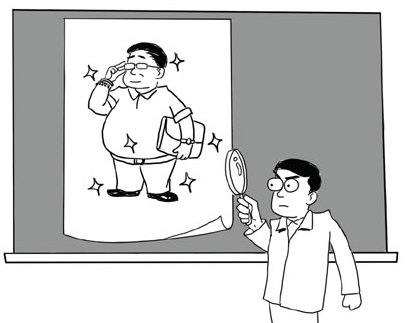A fancy watch is corruption tipoff
- By Wang Yong
 0 Comment(s)
0 Comment(s) Print
Print E-mail Shanghai Daily, September 20, 2012
E-mail Shanghai Daily, September 20, 2012
Government watchdogs have found themselves forced to learn all about luxury goods as they seek clues to corruption by studying the fabric and cut of an official's tailored suit and the timepieces on their wrists.
|
|
|
[By Zhou Tao/Shanghai Daily] |
In an article posted Tuesday on sina.com.cn, a leading information portal, a discipline official of the Communist Party of China in Beijing was quoted as saying: "There was once a case in which we would have had no way of knowing that eyeglass frames could cost several million yuan if a bribed official had not confessed of his own accord to owning them."
Eye wear
In a similar vein, shrewd Internet users recently noted that the eye wear of a senior local official in charge of workplace safety appeared to be a fancy Lotos brand, worth at least 138,000 yuan (about US$22,000). Yang Dacai, responsible for workplace safety in Shaanxi Province, scurried to the scene of a traffic tragedy on August 26, when 36 passengers (including a driver) perished as two trucks collided. Although one would expect a public servant to at least appear to be devastated and heartbroken, Yang instead was beaming, and his happy expression outraged people who saw his photos.
But attention soon shifted from his grin to what he was wearing that day, and on many other occasions. Determined Internet users researched past photos of Yang and found that he had worn at least 11 different expensive watches on various public occasions. Their total value was difficult to imagine.
It didn't end there. The latest discovery was luxury eye wear, not identified by Party discipline inspectors, but by a muckraking public. Yang is now under investigation.
To be sure, not only Party discipline officials, but also the general public are unlikely to know at a glance the value of a piece of wristwatch jewelry or a pair of eyeglasses. Thus, it becomes necessary to study luxury brands and items, many of them not ostentatious, to identify the likelihood of bribe-taking. But knowledge about luxury is not key to curbing corruption.
Even if they don't know the brand names of those watches or eyeglasses, discipline officials should know from common sense that what corrupt officials wear and carry are quite different from the apparel and style of a clean official.
As the sina story says, the average income of Chinese civil servants was about 5,000 yuan a month in 2008. How could such a meager income enable someone to acquire 11 expensive timepieces and eyeglasses, as in the case of Yang?
It's the job of an expert panel to examine and explicate what a suspect official wears. What a discipline official should do is to understand how a devoted Communist cadre should dress - with simplicity, not splendor. He or she should dress like the rank-and-file he or she serves. Anything beyond that should be sufficient cause for suspicion and investigation.
Many government officials today feel no shame about flaunting luxury brand fashion, accessories, bags, jewelry and gadgets. Just as an official's mistress is generally considered to be a giveaway about illicit gains, similarly these luxuries are an obvious tipoff.
Luxury items adorning public officials are nothing new. From 2005 to 2007, certain Beijing news media conducted random research of 100 court cases of bribery and found that small luxury items such as wristwatches were the most common bribes to government officials around the time of the Chinese Lunar New Year - dwarfing the number of cars and houses.
Ding Meng, an official once in charge of land requisitions in Chongqing City, was sentenced to 13 years in prison in 2009 for trading public land for bribes. He wore a T-shirt worth 800 yuan even when he was detained for investigation. He told a prosecutor that he usually wore a suit worth more than 10,000 yuan, with his most expensive suit costing far more than 40,000 yuan. At the time, Ding was dubbed China's most stylish corrupt official. He used bribes accepted from 2006 to 2007 to buy expensive clothes, clay teapots and cars.
Prosecutors did not have to learn the value of a rare clay teapot to put Ding in prison. They did have common sense.
Watchdogs who have zero-tolerance of corruption don't need to be an expert on luxury brands to be able to cast a suspicious eye on conspicuous official consumption, such as Yang's eyeglasses.







Go to Forum >>0 Comment(s)